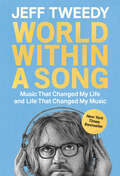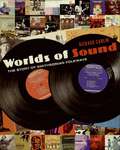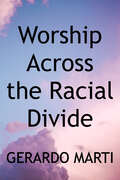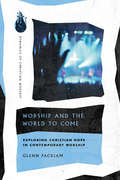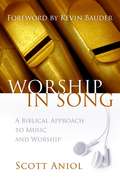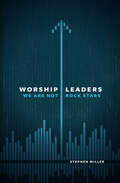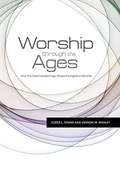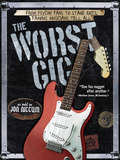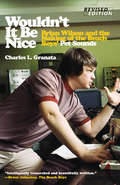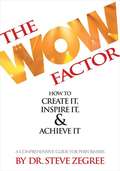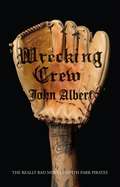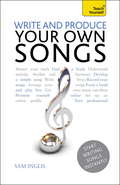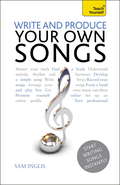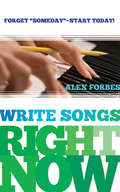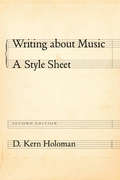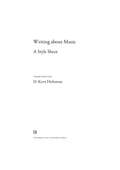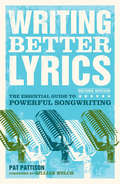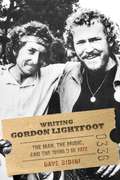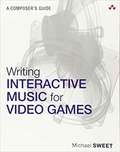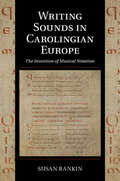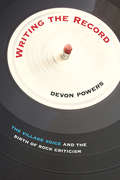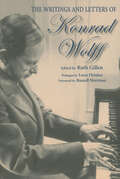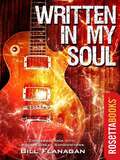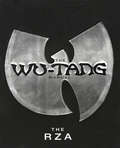- Table View
- List View
World Within a Song: Music That Changed My Life and Life That Changed My Music
by Jeff TweedyAn exciting and heartening mix of memories, music, and inspiration from Wilco front man and New York Times bestselling author Jeff Tweedy, sharing fifty songs that changed his life, the real-life experiences behind each one, as well as what he’s learned about how music and life intertwine and enhance each other. <p><p> What makes us fall in love with a song? What makes us want to write our own songs? Do songs help? Do songs help us live better lives? And do the lives we live help us write better songs? <p><p> After two New York Times bestsellers that cemented and expanded his legacy as one of America’s best-loved performers and songwriters, Let’s Go (So We Can Get Back) and How to Write One Song, Jeff Tweedy is back with another disarming, beautiful, and inspirational book about why we listen to music, why we love songs, and how music can connect us to each other and to ourselves. <p><p>Featuring fifty songs that have both changed Jeff’s life and influenced his music—including songs by the Replacements, Mavis Staples, the Velvet Underground, Joni Mitchell, Otis Redding, Dolly Parton, and Billie Eilish—as well as Jeff’s “Rememories,” dream-like short pieces that related key moments from Jeff’s life, this book is a mix of the musical, the emotional, and the inspirational in the best possible way. <p> <b>New York Times Bestseller</b>
Worlds of Sound: The Story of Smithsonian Folkways
by Richard CarlinA man, a microphone, and a dreamWhen he opened his tiny recording studio in New York in 1940, Moses Asch had a larger-than-life dream: To document and record all the sounds of his time. He created Folkways Records to achieve his goal, not just a record label but a statement that all sounds are equal and every voice deserves to be heard. The Folkways catalog grew to include a myriad of voices, from world- and roots-music to political speeches; the voices of contemporary poets and steam engines; folk singers Lead Belly and Woody Guthrie and jazz pianists Mary Lou Williams and James P. Johnson; Haitian vodoun singers and Javanese court musicians; deep-sea sounds and sounds from the outer ring of Earth's atmosphere. Until his death in 1986, Asch—with the help of collaborators ranging from the eccentric visionary Harry Smith to academic musicologists—created more than 2000 albums, a sound-scape of the contemporary world still unequalled in breadth and scope. Worlds of Sound documents this improbable journey. Along the way you'll meet:A young Pete Seeger, revolutionizing the world with his five-string banjo The amazing vocal ensembles of the Ituri PygmiesNorth American tree frogsElla Jenkins's children's musicLead Belly singing "The Midnight Special"The nueva canción of Suni Paz. Folkways became a part of the Smithsonian Institution's collections shortly after Asch's death. Today Smithsonian Folkways continues to make the "worlds of sound" Moe Asch first dreamed of 60 years ago available to all. The Folkways vision is expansive and all-inclusive, and Worlds of Sound advances its rich and lively spirit.
Worship Across the Racial Divide: Religious Music and the Multiracial Congregation
by Gerardo MartiMany scholars and church leaders believe that music and worship style are essential in stimulating diversity in congregations. Gerardo Marti draws on interviews with more than 170 congregational leaders and parishioners, as well as his experiences participating in worship services in a wide variety of Protestant, multiracial Southern Californian churches, to present this insightful study of the role of music in creating congregational diversity. <p><p>Worship across the Racial Divide offers a surprising conclusion: that there is no single style of worship or music that determines the likelihood of achieving a multiracial church. Far more important are the complex of practices of the worshipping community in the production and absorption of music. <p><p>Multiracial churches successfully diversify by stimulating unobtrusive means of interracial and interethnic relations; in fact, preparation for music apart from worship gatherings proves to be just as important as its performance during services. Marti shows that aside from and even in spite of the varying beliefs of attendees and church leaders, diversity happens because music and worship create practical spaces where cross-racial bonds are formed. <p><p>This groundbreaking book sheds light on how race affects worship in multiracial churches. It will allow a new understanding of the dynamics of such churches, and provide crucial aid to church leaders for avoiding the pitfalls that inadvertently widen the racial divide.
Worship and the World to Come: Exploring Christian Hope in Contemporary Worship (Dynamics of Christian Worship)
by Glenn PackiamChristians sing because we are people of hope. Yet our hope is unlike other kinds of hope. We are not optimists; nor are we escapists. Christian hope is uniquely shaped by the resurrection of Jesus Christ from the dead and by the promise of our own future resurrection. How is that hope both expressed and experienced in contemporary worship? In this volume in the Dynamics of Christian Worship series, pastor, theologian, and songwriter Glenn Packiam explores what Christians sing about when they sing about hope and what kind of hope they experience when they worship together. Through his analysis and reflection, we find that Christian worship is crucial to both the proclamation and the formation of Christian hope.
Worship in Song: A Biblical Approach to Music and Worship
by Scott AniolFew books have been written that carefully distinguish between secular music that we listen to every day, and sacred music, " Scott Aniol says. "After discussing some foundational matters, the first section considers how to make God-pleasing choices regarding the secular music we listen to, and the second deals more narrowly with sacred music. "Contending that much of the confusion about the music issue is primarily a theological misunderstanding, Aniol discusses such issues as what does Sola Scriptura really mean? the nature of biblical affections, the essence of biblical worship, and the purpose of music in the church. Cultural issues discussed include meaning in music, the nature of pop culture, and different kinds of emotion. Each chapter concludes with aids for discussion so that the book may be used in small groups and classrooms. Further resources are available at worshipinsongbook.com or at the website for Aniol's music and consulting ministry, religiousaffections.org.
Worship Leaders, We Are Not Rock Stars
by Stephen MillerWhy do you lead worship?Often the motives are mixed. You find yourself wanting to point people to Jesus but also feeling a desire to be noticed and praised, to make yourself the center of attention. Stephen Miller is the worship pastor for a large church of young, energetic Christians. He and his band record albums and lead worship for conferences all over the country. He knows the temptation to make himself the show, to pursue fame, to seek the applause of other people. And he has learned to want nothing to do with it. In this book, Miller exhorts his fellow worship leaders to make Jesus the center of all their efforts. He teaches how to do this with Scripture, teaching, prayer, story, and song. In all, Miller&’s call for worship leaders is to lead worship, whole-hearted and whole-minded exalting of God, rather than making a spectacle out of it. Worship Leaders, We&’re Not Rock Stars will encourage and challenge worship leaders by clarifying their purpose and identity, and by doing so will bless those they lead.
Worship Leaders, We Are Not Rock Stars
by Stephen MillerWhy do you lead worship?Often the motives are mixed. You find yourself wanting to point people to Jesus but also feeling a desire to be noticed and praised, to make yourself the center of attention. Stephen Miller is the worship pastor for a large church of young, energetic Christians. He and his band record albums and lead worship for conferences all over the country. He knows the temptation to make himself the show, to pursue fame, to seek the applause of other people. And he has learned to want nothing to do with it. In this book, Miller exhorts his fellow worship leaders to make Jesus the center of all their efforts. He teaches how to do this with Scripture, teaching, prayer, story, and song. In all, Miller&’s call for worship leaders is to lead worship, whole-hearted and whole-minded exalting of God, rather than making a spectacle out of it. Worship Leaders, We&’re Not Rock Stars will encourage and challenge worship leaders by clarifying their purpose and identity, and by doing so will bless those they lead.
Worship Through the Ages: How the Great Awakenings Shape Evangelical Worship
by Vernon M. Whaley Elmer L. TownsThrough the Ages provides a practical, historical and philosophical study of the Great Spiritual Awakenings as related to the worship of evangelicals around the globe. This is a fascinating story that reveals a unifying, unbroken thread of events whereby one can trace the development of worship practices through the ages. With each move of God came a change in the way people worshiped. <P><P>New paradigms were created, debated, accepted and passed on to the next generation. Narrative for this study is energized by telling "the story" of engaging personalities, influencers and movers and shakers. Emphasis is given to changes in worship practices from the Early Church, Reformation, the Great Awakenings, revival movements, large evangelistic crusades of the 1940s and 1950s, Jesus Movement, and the Praise and Worship movement. A chart tracing the development of worship from Genesis 4 to the twenty-first century is included.
The Worst Gig
by Jon Niccum"WORST GIG is Music Appreciation 225, taught by that cool professor everyone wanted to have beers with after class. One fun nugget after another. It was harder to close than my Twitter app."--Matthew James, McSweeney's "Tawdry tales of concert catastrophes!"--Buzzfeed "Musicians' 'Worst Gig' makes for best read ever."--Salon What is the worst show you've ever played? Sometimes the worst shows inspire the best stories. After hundreds of interviews with national headliners and beloved indie acts alike, entertainment journalist Jon Niccum has crafted a collection that chronicles the most embarrassing, most hilarious and most insane live show moments ever. THE WORST GIG features outrageous stories from stars such as Wilco, Def Leppard, Tenacious D, Rush, John Mayer, and The Sex Pistols. Be it nature's wrath, equipment breakdowns or even military intervention, get the wild scoop on what really happened, straight from the artists themselves.
Wouldn't It Be Nice: Brian Wilson and the Making of the Beach Boys' Pet Sounds
by Charles L. Granata Tony AsherWhen he first started working on Pet Sounds, Brian Wilson said that he was going to write "the greatest rock album ever made." That album, released in 1966, fifty years ago, changed the face of popular music.From conception and composition to arrangement and production, Pet Sounds was the work of one extraordinary man. Turning his back on the protest songs and folk rock of his contemporaries and even on the bright surf sound of his own creation, Brian Wilson reached deep within himself to make music that struck an emotional chord and touched people's souls. Embracing the rapidly advancing recording technology of the time, he expertly created an original studio sound that would inspire generations of listeners and musicians.Featuring a detailed track-by-track analysis of the songs and extensive interviews with key personalities, this unique book reveals the influences--musical, personal, and professional--that together created this groundbreaking album. Now revised to include new information and recent developments, this is the definitive book on one of the greatest albums ever made.
The Wow Factor: A Comprehensive Guide for Performers
by Steve ZegreeDr. Steve Zegree of Western Michigan University, choral arranger and conductor of Western Michigan's Gold Company has developed this practical guide for performers, students, teachers and parents which offers fundamental philosophies and concepts that are essential to a person's growth and development and will contribute to a successful professional life in music.
Wrecking Crew: The Really Bad News Griffith Park Pirates
by John Albert"You never know what's going to save you. "After years of dingy nightclubs and drug addiction, John Albert and his hard-luck friends certainly never expected their salvation to arrive in the form of a pastime most often associated with Mom, God, and apple pie. Wrecking Crew -- a highly unusual chronicle of recovery and redemption -- documents the transformation of a group of musicians, struggling screenwriters, and wannabe actors into a competitive band of hardballers. For over a decade, it seemed to be enough: the narcotics, gambling, whores, and aimless rebellion. But as they stumbled into their thirties, the blithe pursuit of self-destruction had simply become exhausting to these battle-scarred denizens of the L. A. counterculture. The romantic squalor of being perpetually broken-down, periodically drug-addled, and irresponsible began to lose its charm. The idea of fielding a baseball team to compete in a hard-knocks amateur league seemed merely the latest in a string of half-hearted stabs at restoring order to their ragged lives. But this escapade was different. When these men donned their team uniforms, the old obsessions started to fade and something incredible began to happen. This is the unforgettable story of the Griffith Park Pirates.
Write and Produce Your Own Songs: Audio eBook
by Sam InglisIs this the right book for me?This book is an essential companion for any aspiring songwriter, and is ideal for those with no formal musical education. Covering every genre of popular contemporary music, from rock and pop to musical theatre and country/western, it tracks everything from what harnessing your creative potential to finding a hook and selling, performing and promoting your songs. It also offers some material for those at a slightly more advanced level who'd like to understand things such as chords and sequencing. With straightforward notation and embedded audio which showcases the process at work, this accessible guide from a professional songwriter will prove indispensable for creating and peforming your own songs.Write and Produce Your Own Songs includes:Chapter 1: Tools of the tradeChapter 2: HooksChapter 3: Basic theoryChapter 4: Developing a hookChapter 5: Developing lyricsChapter 6: Song structureChapter 7: Arranging and recording your songsChapter 8: Playing live and forming a bandChapter 9: Promoting your music on the InternetChapter 10: The professional songwriteLearn effortlessly with a new easy-to-read page design and added features: Not got much time?One, five and ten-minute introductions to key principles to get you started.Author insightsLots of instant help with common problems and quick tips for success, based on the author's many years of experience.Test yourselfTests in the book and online to keep track of your progress.Extend your knowledgeExtra online articles to give you a richer understanding of the subject.Five things to rememberQuick refreshers to help you remember the key facts.Try thisInnovative exercises illustrate what you've learnt and how to use it.
Write and Produce Your Own Songs: Teach Yourself
by Sam InglisIs this the right book for me?This book is an essential companion for any aspiring songwriter, and is ideal for those with no formal musical education. Covering every genre of popular contemporary music, from rock and pop to musical theatre and country/western, it tracks everything from what harnessing your creative potential to finding a hook and selling, performing and promoting your songs. It also offers some material for those at a slightly more advanced level who'd like to understand things such as chords and sequencing. With straightforward notation and embedded audio which showcases the process at work, this accessible guide from a professional songwriter will prove indispensable for creating and peforming your own songs.Write and Produce Your Own Songs includes:Chapter 1: Tools of the tradeChapter 2: HooksChapter 3: Basic theoryChapter 4: Developing a hookChapter 5: Developing lyricsChapter 6: Song structureChapter 7: Arranging and recording your songsChapter 8: Playing live and forming a bandChapter 9: Promoting your music on the InternetChapter 10: The professional songwriteLearn effortlessly with a new easy-to-read page design and added features: Not got much time?One, five and ten-minute introductions to key principles to get you started.Author insightsLots of instant help with common problems and quick tips for success, based on the author's many years of experience.Test yourselfTests in the book and online to keep track of your progress.Extend your knowledgeExtra online articles to give you a richer understanding of the subject.Five things to rememberQuick refreshers to help you remember the key facts.Try thisInnovative exercises illustrate what you've learnt and how to use it.
Write Songs Right Now
by Alex ForbesWrite Songs Right Now is a hands-on, step-by-step guide to creating original pop songs—an approach that has been road-tested by thousands of Alex’s students and coaching clients in New York City, some of whom have gone on to achieve great success. With insight, enthusiasm, and humor, Alex guides listeners through the process of brainstorming for ideas, crafting effective lyrics, and putting those lyrics to music. Whether you’ve written one song or one hundred, this audiobook will show you how to take your songwriting to new levels. Each chapter lays out the basics of a different element of songwriting, including song form, lyrics, melodies, chord construction, song dynamics, and the essential ingredients of a killer hook. There are lots of fun exercises to strengthen your songwriting muscles and increase your confidence. Alex also encourages up-and-coming writers to participate in songwriting communities locally and online, and makes a strong case for collaborating as a way to generate even better material.
Writing about Music
by D. Kern HolomanHow do you spell "Mendelssohn"? Where do you place the hyphen in "Beethoven" if it breaks between two lines? Is it "premiere" or "première"? The answers and much more can be found in this completely revised and updated resource for authors, students, editors, concert producers--anyone who deals with classical music in print. This essential volume covers some of the thorniest issues of musical discourse: how to go about describing musical works and procedures in prose, the rules for citations in notes and bibliography, and proper preparation of such materials as musical examples, tables, and illustrations. One section discusses program notes, another explains the requirements for submitting manuscripts and electronic files. A new section outlines best practices for student writers. An appendix lists common problem words.
Writing about Music
by D. Kern HolomanHow do you spell "Mendelssohn"? Where do you place the hyphen in "Beethoven" if it breaks between two lines? Is it "premiere" or "première"? The answers and much more can be found in this completely revised and updated resource for authors, students, editors, concert producers--anyone who deals with classical music in print. This essential volume covers some of the thorniest issues of musical discourse: how to go about describing musical works and procedures in prose, the rules for citations in notes and bibliography, and proper preparation of such materials as musical examples, tables, and illustrations. One section discusses program notes, another explains the requirements for submitting manuscripts and electronic files. A new section outlines best practices for student writers. An appendix lists common problem words.
Writing Better Lyrics Second Edition: Essential Guide To Lyric Form And Structure: Tools And Techniques For Writing Better Lyrics (Songwriting And Lyrics Ser.)
by Pat PattisonPattison presents a unique, in-depth approach to the process of lyric writing. Songwriters will examine 17 extraordinary songs and learn the distinct elements that make them so effective. Pattison then presents more than 30 lyric-writing exercises designed to achieve the same results. From generating lyric ideas and managing repetition to developing verses, it's all here. Songwriters will: find warm-up exercises that revolutionize songwriting imagery; use a rhyming dictionary and a thesaurus to generate ideas and find snappy rhyme; create meaningful metaphors and similes while avoiding cliches; develop verses by using or breaking conventional rules; experiment with point of view in every lyric to make a song stand out
Writing Gordon Lightfoot: The Man, the Music, and the World in 1972
by Dave BidiniFrom acclaimed musician and author Dave Bidini comes a brilliantly original look at a folk-rock legend and the momentous week in 1972 that culminated in the Mariposa Folk Festival.July, 1972. As musicians across Canada prepare for the nation's biggest folk festival, held on Toronto Island, a series of events unfold that will transform the country politically, psychologically--and musically. As Bidini explores the remarkable week leading up to Mariposa, he also explores the life and times of one of the most enigmatic figures in Canadian music: Gordon Lightfoot, the reigning king of folk at the height of his career. Through a series of letters, Bidini addresses Lightfoot directly, questioning him, imagining his life, and weaving together a fascinating, highly original look at a musician at the top of his game. By the end of the week, the country is on the verge of massive change and the '72 Mariposa folk fest--complete with surprise appearances by Bob Dylan, Neil Young, Joni Mitchell, and yes, Lightfoot--is on its way to becoming legendary.From the Hardcover edition.
Writing Interactive Music for Video Games: A Composer's Guide (Game Design)
by Michael SweetWritten by the developer of Berklee School of Music’s pioneering game scoring program, this guide covers everything professional composers and music students need to know about composing interactive music for video games, and contains exclusive tools for interactive scoring―tools that were previously available only at Berklee. <p><p> Drawing on twenty years of professional experience in the game industry, Michael Sweet helps you master the unique language of music storytelling in games. Next, he walks you through the entire music composition process, from initial conceptualization and creative direction through implementation. <p><p> Inside, you’ll find dozens of examples that illustrate adaptive compositional techniques, from small downloadable games to multimillion dollar console titles. In addition, this guide covers the business side of video game composition, sharing crucial advice about contracts, pricing, sales, and marketing.
Writing Sounds in Carolingian Europe: The Invention of Musical Notation (Cambridge Studies in Palaeography and Codicology #15)
by Susan RankinMusical notation has not always existed: in the West, musical traditions have often depended on transmission from mouth to ear, and ear to mouth. Although the Ancient Greeks had a form of musical notation, it was not passed on to the medieval Latin West. This comprehensive study investigates the breadth of use of musical notation in Carolingian Europe, including many examples previously unknown in studies of notation, to deliver a crucial foundational model for the understanding of later Western notations. An overview of the study of neumatic notations from the French monastic scholar Dom Jean Mabillon (1632–1707) up to the present day precedes an examination of the function and potential of writing in support of a musical practice which continued to depend on trained memory. Later chapters examine passages of notation to reveal those ways in which scripts were shaped by contemporary rationalizations of musical sound. Finally, the new scripts are situated in the cultural and social contexts in which they emerged.
Writing the Record: The Village Voice and the Birth of Rock Criticism
by Devon PowersDuring the mid-1960s, a small group of young journalists made it their mission to write about popular music, especially rock, as something worthy of serious intellectual scrutiny. Their efforts not only transformed the perspective on the era's music but revolutionized how Americans have come to think, talk, and write about popular music ever since. In Writing the Record, Devon Powers explores this shift by focusing on The Village Voice, a key publication in the rise of rock criticism. Revisiting the work of early pop critics such as Richard Goldstein and Robert Christgau, Powers shows how they stood at the front lines of the mass culture debates, challenging old assumptions and hierarchies and offering pioneering political and social critiques of the music. Part of a college-educated generation of journalists, Voice critics explored connections between rock and contemporary intellectual trends such as postmodernism, identity politics, and critical theory. In so doing, they became important forerunners of the academic study of popular culture that would emerge during the 1970s. Drawing on archival materials, interviews, and insights from media and cultural studies, Powers not only narrates a story that has been long overlooked but also argues that pop music criticism has been an important channel for the expression of public intellectualism. This is a history that is particularly relevant today, given the challenges faced by criticism of all stripes in our current media environment. Powers makes the case for the value of well-informed cultural criticism in an age when it is often suggested that "everyone is a critic."
The Writings and Letters of Konrad Wolff (Contributions To The Study Of Music And Dance Ser. #No. 48)
by Ruth Gillen"[Wolff] is a remarkable pianist, an excellent theoretician, a learned teacher, a brilliant thinker and writer." --Artur Schnabel"This collection of [Wolff's] writings and letters should bear ample testimony to a musician who happily combined the artist, the teacher, the musicologist, and the charm and integrity of a human being." --Alfred Brendel"Konrad Wolff writes about music with the verve and enthusiasm of a great teacher who has never lost his sense of music as an adventure. To read him is to enter into a lively dialogue with a superior musical mind and a buoyant spirit." --Richard GoodeThis collection provides elegant and thorough portraits of an important 20th-century performer and lover of music, as well as of his greatest influences.
Written in My Soul
by Bill FlanaganWritten in My Soul, first published in 1986, is a snapshot of some of rock & roll's most iconic artists at the same moment. Bill Flanagan, who would go on to create VH1 Storytellers and CMT Crossroads, spoke about songwriting and creativity with Bob Dylan, Chuck Berry, Carl Perkins, Joni Mitchell, Mick Jagger, Paul Simon, Van Morrison, Bruce Springsteen, Elvis Costello, Bono and nineteen more music legends. Long a collector's item, second hand copies of Written in My Soul have sold for over a hundred dollars. It is a look at rock & roll history from inside the heads of the people who made it. ABOUT THE AUTHOR Bill Flanagan is executive vice president and editorial director of MTV Networks. He is also the author of A&R, New Bedlam, U2 at the End of the World, Last of the Moe Haircuts, and the novel Evening's Empire. Flanagan has written for several magazines, including Esquire, GQ, Rolling Stone, Spy, and Vanity Fair.
The Wu-Tang Manual
by The RZA Chris NorrisThe Wu-Tang Manual is The RZA&’s first written introduction to the philosophy and history of Hip-Hop&’s original Dynasty, the Wu-Tang Clan.Written in a style that is at once personal and philosophical, The Wu-Tang Manual unravels the intricate web of personalities (and alter egos), warrior codes, numerological systems, and Eastern spiritual ethics that define the Wu-Tang dynasty. Packed with information that reflects the breadth and depth of the RZA&’s — and rest of the Clan&’s — intellectual interests and passions, The Wu-Tang Manual is divided into four books of nine chambers each, for a total of 36 chambers. All together, the book provides the breakdown of essential Wu-Tang components, from basic information about each of the nine core members of Wu-Tang Clan to deeper explorations of the key themes of the Wu-Tang universe, a dictionary-like Wu-Slang lexicon, and an entire section of Wu-Tang lyrics with densely annotated explanations of what they mean. For the hardcore Wu-Tang disciple and the recent initiate alike, The Wu-Tang Manual is the definitive guide to the essence of Wu, one of the most innovative hip-hop groups of all time.The RZA's most recent book, The Tao of Wu, is also available from Riverhead Books.
